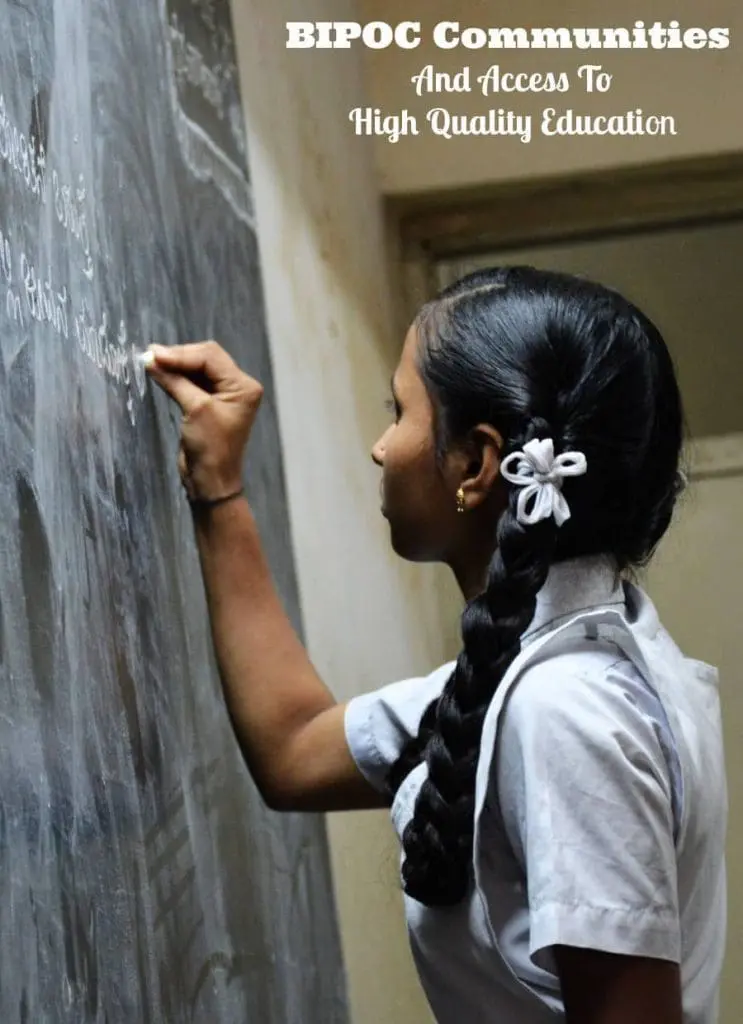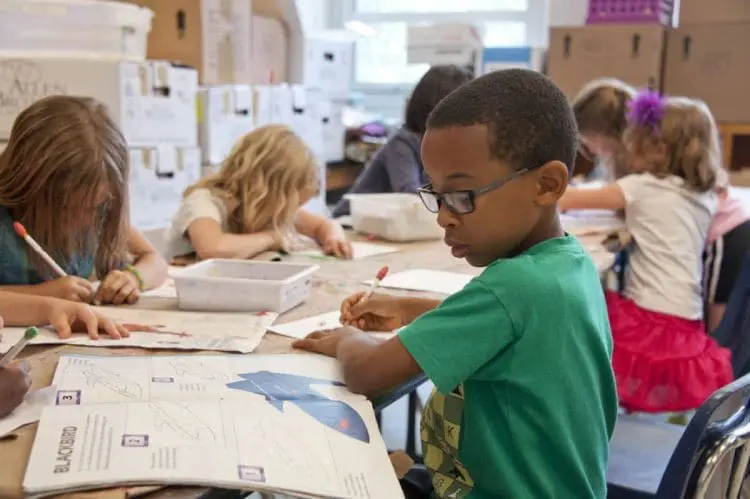I am a huge believer in education as the door to a better life. As Americans, it is clear that this is a principle we hold dear. After all, we offer public education for K-12. While this is a beautiful sentiment that we call all share, I have noticed that we don’t all get access to the same quality of education. It never seemed right to me that some schools can barely afford text books while others have all the newest editions. I think of this inequality as mostly being disproportionate between poor districts and rich districts. The truth is that this means that BIPOC communities are often left underserved. That is why I am happy to welcome Collette Bowers Zinn. She will be sharing her point of view on the importance of private schooling particularly for BIPOC students.

Why Access To Quality Education Should Be A Priority
The better quality of education you receive, the more likely you are to have useful skills to help you in life. I also believe that high quality education is more likely to lead you to pursue higher education options. As someone who moved many times while in K-12, I attended many different schools. This meant that I could see first hand the differences in the available education. I could also see the difference in the results when looking at my classmates and where they ended up. The quality of education I received definitely effected my own motivation to work hard and learn.
I think most people would agree that we all deserve access to a high quality education. It is objectively, a very important factor in determining our future. The US Bureau of Labor Statistics compared unemployment rates and earnings by educational attainment. The results clearly show that education pays. In other words, the more education, the less chance of unemployment. Additionally the more education, the higher salary you are likely to earn.
High quality education should be a priority because it makes the lives of individual better. In addition, it makes the society better as a whole! Education is the key to lifting many out of poverty and raising the standard of living.
Here are a few statistics that show we care about education:
- 77% believe that education will increase “America’s ability to compete successfully in the global economy.”
- 75% believe that education will make “our communities safer and better places to live.”
Now, we just have to make it a priority to make sure every American citizen can get a good education, regardless of their zip code or skin color. We all deserve access to high quality education. Farmers and city kids alike. White communities and BIPOC communities alike.
Lots of basic skills are learned during an early childhood education. Primary school helps prepare us to be successful learners while secondary school helps us master more advanced skills and knowledge. Both education systems need qualified teachers to inspire our young people are scoring high in educational achievement.
What Does BIPOC Stand For?
According to Merriam-Webster, BIPOC stands for Black, Indigenous, (and) People of Color. The BIPOC communities are those that are most effected by systemic racial injustices. Equitable quality education should be available, African-Americans, Native American students, Hispanic students, Asian students, and low-income families. Gender equality should also be a given. Socioeconomic status should not matter.
That is why I am happy to have a guest post today from Collette Bowers Zinn. She focuses on supporting BIPOC students in an immediate, actionable way.
Collette Bowers Zinn is a fourth-generation educator and the founder of Private School Axis, an organization that bridges communities of color and private/independent schools by helping under-served families of color navigate the school enrollment process, recruiting and supporting educators of color in schools, and providing DEI development to private/independent schools. A Black mother herself, she has first-hand experienced the benefits of private schooling for her children.

Why Access to Private Schooling is Pivotal for BIPOC Students
By Collette Bowers Zinn
Institutionally, the public school system was not built to benefit children of color. Since funding is dependent on property values, and admission is dependent on geographic location, it leads to less than equitable access to high-quality education for BIPOC children. Instead, the public educational system supports the wealthy class of a capitalistic society, who can afford to relocate to better-funded school districts. While public schools are the only option for some families, private schools should be seriously considered by more.
BIPOC Students Benefit Form Individualized Academic Attention
When BIPOC children are given individualized academic attention, resources, and opportunities through the private school system, they are put in a better position to achieve. The private schooling experience is undeniably exceptional; smaller classroom sizes, more resources, less red tape, newer materials, and updated teaching techniques and curriculums that are more aligned with current research. They place students at an advantage in their current and future educational pursuits.
Private schools are also at an advantage because they do not have to consult with government guidelines or navigate unnecessary red-tape to enact changes they deem necessary on a day-to-day basis. These schools are free to do what’s in the best interest of their students, at a moment’s notice.
Numerous New Resources
As BIPOC children are enrolled in private schools, they are able to take advantage of the numerous resources now available to them to explore new opportunities and passions, all while being members of a supportive community and lifelong network. Private schools offer advisors and skilled teachers who are willing and available to assist the students, in much smaller class and community sizes, whenever they need guidance or academic help. And, long term, you cannot beat any child’s network in private schools and the school’s community. Alumni pools and databases, check-ins, invites to events and an introduction to the upper echelon of education societies are indispensable resources.
More Likely To Attend College
According to the Counsel for American Private Education, private school ninth-graders are 25% more likely to attend college, furthering students’ success in the long term.
Although the cost can be jarring, private school tuition is not the price that it is because they’re trying to make a pretty penny off of your child. In fact, most people don’t know that the student tuitions don’t even cover 100% of the operating costs of these intuitions. That’s why annual giving campaigns and alumni donations are integral to the running of private schools. But the tuition and donations are worth it when parents see the undeniable benefits that the private school structure has for their child’s development.
Whereas in a public school a child may be in a class of forty, small private school classes ensure that no child gets lost in the crowd. Instead students receive individualized attention where they are properly seen and heard as students. They also receive more assistance with their college search and financial aid applications from school counsellors.
Increasing Diversification Of Private School Environments
Historically private schools have not always been so inclusive. They originally existed to specifically cater to wealthy, white students. They thrived after the Brown vs. Board of Education ruling resulted in mass “white flight,” aka the large-scale migration of white people out of geographic areas that were becoming more racially diverse.
According to the National Center For Education Statistics, Black students currently make up only 9% of the United States private school student population. The increasing diversification of private school environments allows for better learning outcomes. These are not tied to tokenism, but instead equally benefit the community as a whole. Studies show that all students benefit from increased critical thinking and problem-solving skills, engaged conversations, open-mindedness, awareness of implicit subconscious biases, and so much more in diverse and balanced classrooms.
Schools need to commit to being healthy environments for sustaining the diversity that they’re attracting and must do so through professional development and accreditation systems. They also must engage in genuine reassessments of their diversity, equity, and inclusion practices to see what disparities come to light and make the necessary changes in their foundational structure to support their BIPOC students.
When BIPOC Students Are Supported, They Can Thrive
When BIPOC children are properly supported in these private schools, they are seen and supported not just as children of color, but as members of these private school communities. They are able to explore who they are as learners.
Even with all of this information, it can still be daunting to decide which school is best for your child. It’s important to do your research and to let your intuition guide you, remembering during your search that you don’t have to settle for anything that is not a good match or just doesn’t feel right for your child and your family. The best gift you can give your child is that of a great education, so if you are finding the process overwhelming, don’t hesitate to reach out for help. Private School Axis specializes in helping families of color navigate the private school exploration, selection, admission, and enrollment process, and is dedicated to bridging communities of color to these exceptional educational institutions.
Organizations like Private School Axis understands how challenging the process can be, but specifically exists as an organization to help diverse families break the cycles of inequity and access the highest quality education for their children so that they too can go forth and use the critical thinking skills, emotional intelligence, relationships, and knowledge obtained through their private schooling education to continually break the cycles of inequality and disenfranchisement.
Conclusion On Education Access
Thanks again to Collette Bowers Zinn for sharing her perspective on the importance of private schooling particularly for BIPOC students. It is an interesting point that enrollment in private school is a way to bypass the public school system which wasn’t built to benefit children of color. I think this is a good short term solution for BIPOC communities that are underserved to take action for their own children. I hope that we, as country, can find a way to offer equal access to high quality education to everyone, everywhere in the United States.
Related Posts:
Sproutly Private Social Network For Family
